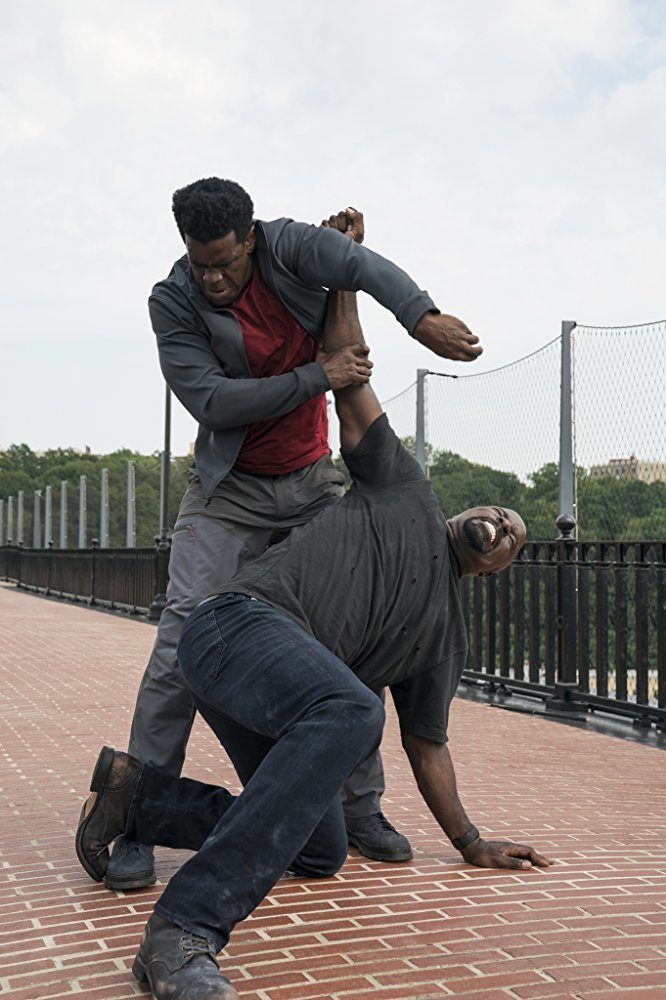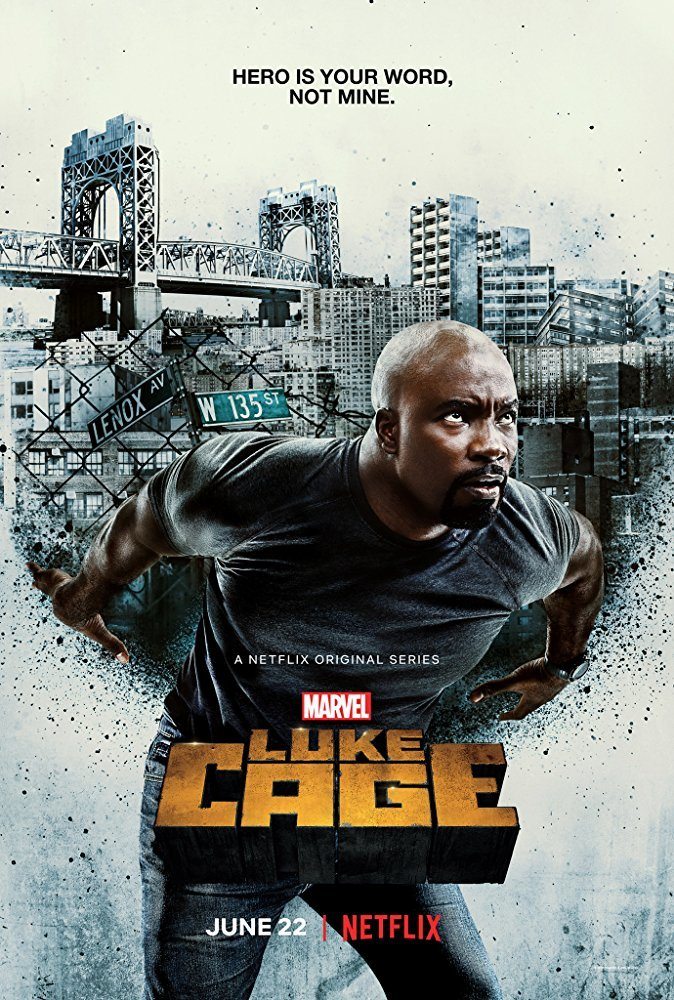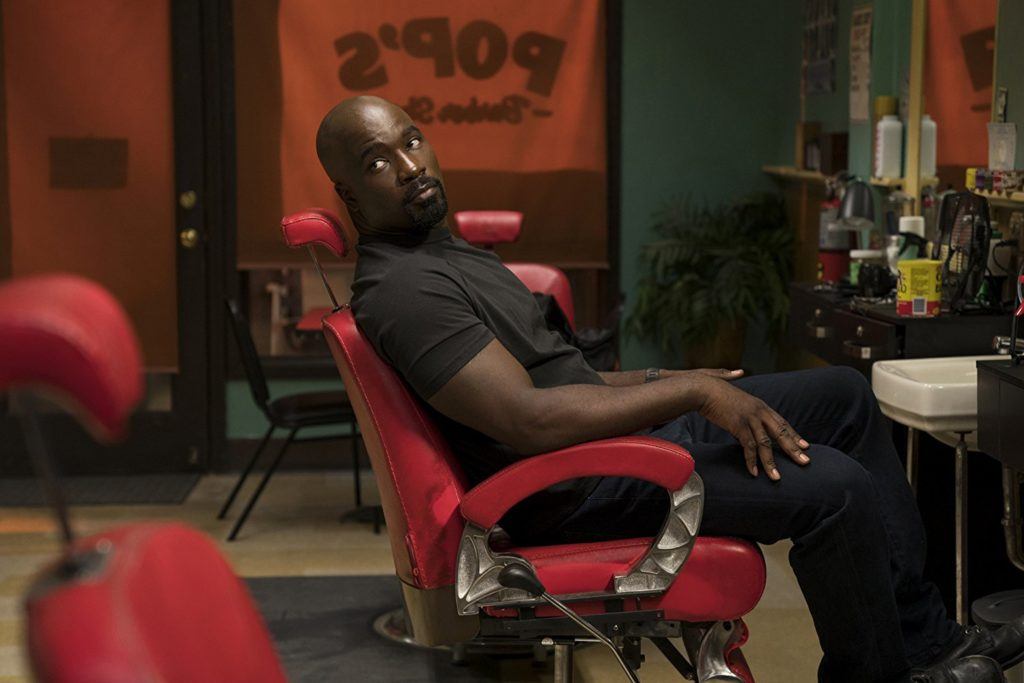“Everybody talkin’ about Luke Cage like he’s Jesus . . .” – Pastor Lucas, Luke’s father
The Bulletproof King of Harlem is risen. In one fell swoop, the second season of Marvel’s “Luke Cage” erases all the recent misfires of “Jessica Jones Season 2,” “Iron Fist,” and the so-so crossover series that was “The Defenders.” In the same way that Marvel/Netflix’s co-production of “The Punisher” succeeded by embracing the realities of PTSD in veterans and the pathology of gun culture in the United States, this series digs deep and with precision. Driving the hard-hitting action sequences is a fully realized world with characters of color, both male and female, at the epicenter of hyper-capitalism, gentrification, and the purpose of family in such an environment.
“My Name is My Name” – Luke Cage via Pusha T
Season 2 finds Luke as a man in the crossfire of not only his own personal and moral battles, but also a war of crime families for control of Harlem. Free from Seagate and with his name cleared, Luke patrols the streets of Harlem as the community’s “Soul Brother Number One.” At the same time, the realities and sacrifices of being a pro bono hero whom no one can pin his true allegiances inevitably drives a wedge between himself and Clare Temple. Meanwhile, he must contend with the violent return of John “Bushmaster” McIver, the Jamaican heir apparent of former business associates of the Stokes family. His presence introduces the larger mob world of the New York City into the show as he takes over the Yardies in Brooklyn as his personal army for the hostile takeover of the Stokes’ empire.
As the war for Harlem threatens the safety of everything from the Hudson to the East River and 116th to 155th streets, Misty Knight struggles to become whole again after losing her arm in the battle with the Hand in “The Defenders.” Ostracized by her peers and insecure with the loss of her limb, she overcomes all and emerges with fresh tech from the Rand Corporation and a revitalized badass strength with a look that recalls Luke Skywalker in “Return of the Jedi.” When the dust settles after a whirlwind of double-crosses, reveals, and brutal action sequences, a new Kingpin will rise from the chaos and Harlem will never be the same.
“Family First”
The heart of the series considers the meaning of family and what loyalty to those bonds entail. Mariah, descending into alcoholism and a penchant for violence, battles the memory of her grandmother, the OG Mama Stokes. Meanwhile, she reaches out to her own estranged daughter, Tilda, but being both a politician and a crime lord, her intentions are dubious. Mariah wants to seduce her daughter into inheriting her legacy in the same way that she succumbed to the darkness of their family’s past. The introduction of Tilda creates a heavy tension in the relationship between Mariah and Shades, and leads to the reveal of a huge Stokes family secret that echoes the darkness and madness of maintaining an empire built on violence.
Bushmaster (portrayed by Mustafa Shakar) is a sympathetic and compelling antagonist, more deadly and more charming than Diamondback. He walks a vengeful path to destroy and claim the Stokes’ empire built upon the broken agreement and violent betrayal between their families. In his mind, he already owns Harlem, both by birthright and by publicly putting Luke through a thorough beatdown. Whereas Diamondback relied on technology to match Luke, Bushmaster embraces the prowess of Obeah, a system of Afro-Caribbean mysticism developed and practiced amongst the Maroons in the early 18th century. He first appears as a relentless fighter and merciless usurper amongst the Yardies, but when the series reveals his backstory, you find yourself just as Luke – caught between two warring factions with their own legitimate claims to power in Harlem.
Luke’s familial trials arise with the sudden return of his father who basically disowned him upon his first stint as an inmate in Seagate. In the previous season, Luke’s father existed as a mere specter, the unseen force whose own infidelity literally birthed the conflict that Harlem would know as Diamondback vs. Luke Cage. In confronting his father, Luke comes face to face with his own arrogance and self-righteousness that over the course of the series we see emerge in bouts of excessive violence. As a result, he becomes lost in his own hype, driven by commercial interests, and like many a celebrity turned parody, he teeters closer to a darker path than he may realize.
“Black wealth is Black power.” – Maria Stokes
Both as a community and collective protagonist, Harlem itself is the most important and most complex character of the series. Anyone who has experienced life anywhere between Covent and Lexington know the colors, the smells, and sounds of Harlem is a singularity amongst the world. Harlem will tell you to shut the fuck up. Harlem will tell you where you are really from and where to go, whether you want it or not. Harlem is everything in this series and the colors, the faces, the attitudes, and even the current issues of gentrification are rendered masterfully.
When the streets need something, they yell it and Luke is not exempt from being held accountable for everything he can and cannot stop. After all, it is Mariah’s love of Harlem that drives her beyond morality and eventually beyond sanity. However, Harlem cannot and will not belong to her or any other false idol; in order for it to live, Harlem, like any community, must belong to the people. When Mariah spouts “…without me, God help Harlem. God help us all,” we know that her so-called love of Harlem only so thinly veils her guilt-ridden narcissistic savior complex.
Uptown Western

The series features some iconic action pieces, namely the battle of Bushmaster and Luke on the bridge. Whereas Luke’s combat style comes from boxing and prison ring matches, Bushmaster comes from a Capoeira school of fighting that is only enhanced by his use of the mystical Obeah. When Luke and Danny reunite in “The Main Ingredient.” we finally see Power Man & Iron Fist get their own fastball special with the “Patty Cake,” a move guaranteed to a rock a room to its foundations. Misty Knight leads the charge on several hard-hitting sequences herself, and literally with one arm in a bar room brawl with a little help from Colleen Wing. Her journey to become whole again mirrors that of Luke’s in the middle of a community turned mob war-zone and amidst corruption within her own department.
Details (Like Representation & Black Lives) Matter
While it is a fun show, what makes it unique and admirable amongst the Marvel line is that it is the most literate and intellectual of any of their productions. Chalk this up to the collaboration between Showrunner Cokar, writers, and directors. The easter eggs in the production design, cinematographic quotes, and dialogue are like deciphering lyrics from the best of MC’s – from Black Thought to Rakim. In the flashback sequence involving Mama Stokes and Uncle, the young Mariah can be seen reading Toni Morrison’s “The Bluest Eye.” This subtle prop evokes Mariah’s own insecurity of her past and issues of self-hating colorism within Black communities.
The series then strikes a powerful visual nod to “The Godfather” in the final episode that will shake you after episodes of several dialogues leading up to “the moment.” Just wait for it. Although the episode titles for this season are all based on Pete Rock and C.L. Smooth songs, the series doubles down with the episode “On & On,” which simultaneously throws a literal and visual nod to the Erykah Badu track of the same name.
As an ensemble series, the lead and supporting cast turn in solid performances, top to bottom. Mike Colter delivers a portrayal of a conflicted hero and reluctant kingpin who is both at odds with his estranged father and the reality of continuing a relationship with Rosario Dawson’s powerful Claire Temple. After losing Cottonmouth and Diamondback in Season One, the returning villains of the series – Black Mariah (Alfre Woodard) and Shades (Theo Rossi) – play in the dark depths of an Antony and Cleopatra style romance of power and violence. These characters are throughly bought to life as we learn more of Shades’ past that returns to disrupt his typical hardened gangster cool. Even Finn Jones’ Danny Rand makes a well-timed appearance, showing a great bit of maturity and ease that do not clash with the series tone. Both as a performance and character development, Iron Fist is slow coming into his own. The most powerful and dominant performance of the season looms with sadness as this was the final role of actor Reg E. Cathy (The Wire, House of Cards).
Both on a storytelling and visual level, this season of Luke takes a huge leap forwar by way of directors such as Salli Richardson-Whitfield, Lucy Liu, Kasi Lemmons, Rashad Ernesto Green, and Guillermo Navaro collaborating with series Cinematographer Petr Hlinomaz. Choosing such strong and diverse directorial voices to sculpt the pieces of this series ultimately prove to be its winning card. Each chapter of the series unfolds like its short own film, each building upon the style and reveals of the one before, following a through line conducted by Showrunner Cheo Hodari Cokar.
The original score by Adrian Younge and Ali Shaheed Mohammed paints the world of the series perfectly, giving it the most recognizable sonic palette of any Marvel production to date. Again, the musical guests of Harlem’s Paradise reflect not only the unfuckwithable dearth of the black music tradition, but their performances all underscore key emotional and plot elements. Music is not merely on display to sell records on his series. The music, just as Harlem itself, is a character with something to say. KRS-One, Ghosface Killah, Gary Clark Jr., Stephen Marley, Esperanza Spalding, Faith Evans, Jadakiss, and more all turn in solidly placed performances making for a must-have soundtrack.
Holes in the Hoodie?
The only false notes in the series eventually sort themselves out or at least fade into the background. For a good number of episodes, many of the Jamaican accents by the secondary cast sound vaguely Wakandan and inconsistent. Either through sheer improvement over the course of the production or your own ear just settling into it, the accents are definitely reconciled by the end of the series. Additionally, supporting character Pirahna has moments of treading that fine line of well-timed comedic relief and one-note Jar-Jar antics. Also, new addition, D.W. takes a few episodes to palette, but as a character he represents the hustle culture of Harlem and serves as the voice of the series campier roots as he proudly sells shirts with Luke Cage slogans – “Sweet Christmas,” Sweet-Sister,” and comes up with the branding “Power Man and Iron Fist.” In the right doses, the character plays a role similar to Xander in “Buffy the Vampire Slayer” fame. In order to keep the material from taking itself too seriously, D.W. (his name alone a reference to D.W. Griffith, director of the infamous “Birth of a Nation”, calls the campiness to the foreground and uses it as a moment of levity.
“You can’t break me. You can’t burn me.“ – Luke Cage
Next to “Daredevil” (and in many ways, far beyond), “Luke Cage” stands amogst the other Marvel productions as both the most intelligent and thoroughly realized. Every episode teems with visual references, quotes, and literary, eggs that reveal the series’ commentary on class commercialism, race, and family ties. Cokar and his team masters the source material, orchestrating a perfect twelve episode saga that feels like Sergio Leone in Harlem by way of “New York Undercover” and “The Godfather.”
Walk good, brethren. “Luke Cage” is here to stay. So much to say and so little time. Do yourself a favor and just watch it.
Episode List:Soul Brother 1, Straighten It Out, Wig Out, I Get Physical, All Souled Out, The Basement, On and On. If It Ain’t Rough, It Ain’t Right, For Pete’s Sake, The Main Ingredient, The Creator, Can’t Front on Me, They Reminisce Over You
Want to get Black Nerd Problems updates sent directly to you? Sign up here!
Follow us on Twitter, Facebook,Instagram, Tumblr, YouTube and Google+.






Show Comments